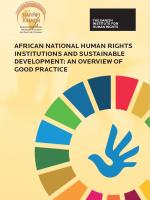Publication

African National Human Rights Institutions and Sustainable Development: An Overview of Good Practice
This report provides guidance to NHRIs and other actors working with a Human Rights-Based Approach in regards to the SDGs and the African 2063 Agenda.
m s
Speed:
Given the intertwined and mutually-reinforcing nature of sustainable development frameworks and human rights standards, National Human Rights Institutions (NHRIs) can play a key role in ensuring accountability for the Sustainable Development Goals (SDGs) and the African 2063 Agenda. Indeed, in the African region, a number of NHRIs are already playing this role, whereas others face challenges in translating the opportunities into tangible actions which contribute specifically to a Human Rights-Based Approach (HRBA) to implementing the SDGs.
As showcased in this compilation of good practices, NHRIs can add tremendous value to joined-up sustainable development and human rights programming and monitoring, contribute to dialogue between state and civil society, and offer critical resources to increase efficiency and coherence.
The objectives of this report are as follows:
- To provide guidance and inspiration to NHRIs based on documentation of good practices and lessons learned, to enable them to engage more effectively and support a human rights-based approach and act as key accountability mechanisms for the implementation of the 2030 and 2063 Agendas.
- To inform and inspire other key sustainable development and human rights actors to build collaborations and partnerships with NHRIs and other key human rights actors, and learn from the experiences of NHRIs in SDG oversight and promotion of a human rights-based approach to the 2030 and 2063 Agendas.
This report is an initiative of the Working Group on the 2030 Agenda for Sustainable Development and the African Agenda 2063 of the Network of African National Human Rights Institutions (NANHRI) and the Danish Institute for Human Rights (DIHR).
We strive to make the pdf versions of our publications etc. accessible for screen readers. If you experience any problems, please contact Digital Editor Stine Juhl Nielsen on stni@humanrights.dk
